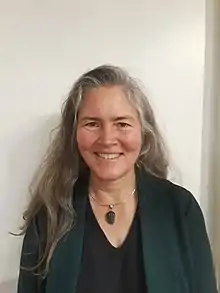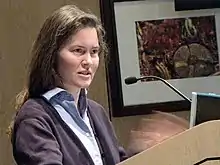Laura Helmuth
Laura Lee Helmuth is an American science journalist and the editor in chief of Scientific American. She was formerly the Health and Science editor at The Washington Post. From 2016 to 2018, she served as the president of the National Association of Science Writers.
Laura Helmuth | |
|---|---|
 After an event in Washington, D.C., December 2022 | |
| Education | Eckerd College (BS) University of California, Berkeley (PhD) University of California, Santa Cruz |
| Occupation | Editor in Chief |
| Employer | Scientific American |
| Board member of | Society for Science and the Public, High Country News, Geological Society of Washington |
Education and early career
Helmuth attended Eckerd College, where she received her Bachelor of Science in biology and psychology in 1991. She then attended the University of California, Berkeley, where she received her PhD in cognitive neuroscience in 1997.[1] She performed her doctoral work in the laboratory of Richard Ivry. Her research centered on the underlying neuroscience of Parkinson's disease and contributed to the thesis Sequence Learning in Patients with Parkinson's Disease.[2] Her research included the role of the cerebellum in verbal function, learning, and attention, as well as studying how the brain coordinates and executes cyclic movements.[3][4]
In 1998, she earned a certificate in science communication from University of California, Santa Cruz.[5] She began her science-writing career as an intern at Science News.[6]
Writer and editor
Helmuth began her writing career as a staff reporter and editor for Science magazine, from 1999 to 2004.[7] She then became a Science Editor at Smithsonian Magazine, where she remained from 2004 to 2012 before becoming the Science and Health editor at the online magazine Slate.[8][9] On April 28, 2016, Helmuth was appointed The Washington Post's editor of Health, Science and Environment,[10] where she initiated a Post series called "Medical Mysteries."[11]
On April 13, 2020, Helmuth became the ninth overall editor-in-chief of Scientific American, succeeding Mariette DiChristina.[1]

Helmuth has written about and lectured on combatting "misinformation through science journalism." She has stated that, in science journalism, it has started to be recognized that "there are not always two sides to every story." She offered the example of evolution, in relation to which she said, "we don’t quote creationists,” while she added that “with climate change, you can disagree about what to do about [it], but the science of it is completely, comprehensively proven.”[11] While at the Washington Post, she oversaw the development of a video series called "The Vaccine Project," written by Anna Rothschild and Brian Monroe, to address vaccine hesitancy.
After the coronovirus pandemic broke, Hellmuth developed, in 2020, a tip sheet for journalists covering the pandemic, noting that "repetition makes misinformation feel more true."[12][13]
Presidential endorsement
In September 2020, Scientific American announced its endorsement of Senator Joe Biden for the 2020 presidential election,[14] breaking, as the media noted, a 175-year tradition of never having endorsed a presidential candidate.[15][16][17][18] [19] Interviewed by NPR, Helmuth stated that the editorial decision was "both unanimous and quick." She added that the magazine needs "to tell what we know about the consequences the Trump administration has had for science, health, the environment, for using evidence, for really understanding and accepting reality," and to "show that this time the choice is just so important for science."[18]
Appointments and service
Helmuth serves as a member of the National Academies of Sciences, Engineering, and Medicine's Standing Committee on the project for Advancing Science Communication Research and Practice.[20][21] She has also given lectures at institutions like the American Institute of Physics, the National Academy of Sciences, and the University of Wisconsin–Madison about how science journalists can counter misinformation and address uncertainty in their reporting.[22][23]
From 2017 to 2018, Helmuth served as president of the National Association of Science Writers.[24] She has also served as a board member for the Society for Science and the Public, and the American Association for the Advancement of Science's SciLine service which connects scientists and journalists.[25]
Bibliography
Articles
- "Hanukkah Food Smackdown! Latkes vs. Hamantashen". Smithsonian. 22 December 2008. Retrieved 8 October 2022.
- "Why Bird Brains Bloom in Spring". Smithsonian. 7 March 2011. Retrieved 8 October 2022.
- "Happy 30th, Sally Ride's First Space Flight. You Came Too Late". Slate. 18 June 2013. Retrieved 8 October 2022.
- "Two Lives: Why Are You Not Dead Yet?". Slate. 5 September 2013. Retrieved 8 October 2022.
- "James Watson Throws a Fit: The disgraced co-discoverer of DNA is selling his Nobel Prize". Slate. 1 December 2014. Retrieved 8 October 2022.
- "Celebrating our demisemiseptcentennial". Scientific American. 323 (3): 6. September 2020. Retrieved 6 October 2022.[n 1]
Awards and honors
- Distinguished Graduate Student Alumni Award, University of California, Santa Cruz, 2019[26]
- Writer in Residence, University of Wisconsin–Madison, 2018[23]
- In 2023 she received the Friend of Darwin award from the National Center for Science Education (NCSE) according to the executive director Ann Reid for having “tirelessly promoted the cause of evolution education”.[27]
Notes
- Online version is titled "Celebrating Scientific American’s 175th anniversary".
References
- "Scientific American appoints Laura Helmuth Editor-in-Chief". Pressroom. Retrieved 6 October 2022.
- Helmuth, Laura Lee; Mayr, Ulrich; Daum, Irene (2000). "Sequence Learning in Patients with Parkinson's Disease: A comparison of spatial-attention and number-response sequences". Neuropsychologia. 38 (11): 1443–1451. doi:10.1016/S0028-3932(00)00059-2. PMID 10906370. S2CID 23803927. Retrieved 6 October 2022.
- Helmuth, Laura Lee; Ivry, Richard B. (1996). "When two hands are better than one: Reduced timing variability during bimanual movements". Journal of Experimental Psychology. Human Perception and Performance. 22 (2): 278–293. doi:10.1037/0096-1523.22.2.278. ISSN 1939-1277. PMID 8934844. Retrieved 6 October 2022.
- Helmuth, Laura Lee; Ivry, Richard B.; Shimizu, Naomi (1997). "Preserved performance by cerebellar patients on tests of word generation, discrimination learning, and attention". Learning & Memory. 3 (6): 456–474. doi:10.1101/lm.3.6.456. ISSN 1072-0502. PMID 10456111. Retrieved 6 October 2022.
- Stephens, Tim. "Physical and Biological Sciences Division honors three prominent alumni". UC Santa Cruz News. Retrieved 11 March 2020.
- "Finding the stories and growing the next crop of science journalists". Science News. 18 September 2019. Retrieved 6 October 2022.
- "My Life As Speaker Series Returns with Science Writer Laura Helmuth". Stonybrook University. 19 September 2019. Retrieved 6 October 2022.
- "Laura Helmuth". Slate. Retrieved 6 October 2022.
- "Two Lives". Slate. Retrieved 2020-03-11.
- "Laura Helmuth joins National team as editor". The Washington Post. Retrieved 6 October 2022.
- Ledda, Brianne (2 October 2019). "Washington Post editor discusses science and transparency at latest 'My Life As' lecture". The Statesman. Retrieved 6 October 2022.
- Helmuth, Laura (2 March 2020). "Tips for covering the coronavirus epidemic effectively without spreading misinformation". National Association of Science Writers. Retrieved 6 October 2022.
- Leber, Rebecca. "Want to avoid spreading coronavirus misinformation? Think like a science journalist". Mother Jones. Retrieved 6 October 2022.
- "Scientific American Endorses Joe Biden". Scientific American. 15 September 2020. Retrieved 6 October 2022.
- Chow, Denise (15 September 2020). "Biden receives endorsement from Scientific American, magazine's first in 175-year history". NBC. Retrieved 6 October 2022.
- Beer, Tommy (15 September 2020). "Scientific American Makes First Presidential Endorsement In Its 175-Year History". Forbes. Retrieved 6 October 2022.
- Musto, Julia (16 September 2020). "Biden wins Scientific American's first endorsement in 175 years". FoxNews. Retrieved 6 October 2022.
- Martin, Rachel (17 September 2020). "'Scientific American' Breaks 175 Years Of Tradition, Endorses A Presidential Nominee". NPR. Retrieved 6 October 2022.
- Belam, Martin (16 September 2020). "Prestigious US science journal to back Biden in first endorsement in 175-year history". The Guardian. Retrieved 6 October 2022.
- "Standing Committee on Advancing Science Communication". National Academies of Sciences, Engineering, and Medicine. Retrieved 6 October 2022.
- National Academy of Sciences (2018). Olson, Steve (ed.). The Science of Science Communication III: Inspiring Novel Collaborations and Building Capacity: Proceedings of a Colloquium. Washington, DC: National Academies Press. doi:10.17226/24958. ISBN 978-0-309-46858-9. PMID 29901953.
- "Laura Helmuth". American Institute of Physics. 12 February 2018. Retrieved 6 October 2022.
- Devitt, Terry (October 18, 2018). "Washington Post's Helmuth is UW Science Writer in Residence". News. University of Wisconsin, Madison. Retrieved October 6, 2022.
- "NASW past presidents". National Association of Science Writers. Retrieved 6 October 2022.
- "Psychology Part II: Our Female Ph.D. Graduates at Berkeley". Berkeley Psychology. University of California, Berkeley. 2019. Retrieved 6 October 2022.
- "2019 Distinguished Graduate Student Alumni". Division of Graduate Studies. UC Santa Cruz. Retrieved October 6, 2022.
- "Friend of Darwin and Friend of the Planet awards for 2023". NCSE.ngo. National Center for Science Education. Archived from the original on 14 August 2023. Retrieved 14 August 2023.